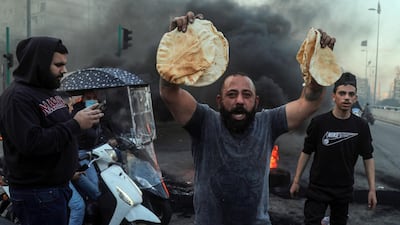Lebanon's prime minister-designate Saad Hariri called on President Michel Aoun to hold early presidential elections after Mr Aoun challenged Mr Hariri to form a cabinet or quit.
"If you cannot sign the decrees forming a salvation government, then allow early presidential elections," Mr Hariri said in a statement on Wednesday.
The process of forming a government has been delayed by haggling between the main ruling parties.
Mr Hariri also asked Mr Aoun to explain why he has so far declined all Cabinets proposed by the premier-designate.
In a televised statement on Wednesday, Mr Aoun said that Cabinet lists proposed by Mr Hariri, who was named to the post of premier last October, did not meet the minimum requirements needed to preserve national accord.
He invited Mr Hariri to the presidential palace "to form the government immediately in agreement with me".
"If he is unable to form and lead a government of national salvation to deal with the dangerous situation in the country, he has no choice but to give way to all those who are capable of carrying out this task," Mr Aoun said.
Mr Hariri said he was surprised by the invitation as he had already submitted his "line-up for a government of non-partisan specialists capable of implementing the reforms required" to Mr Aoun weeks ago.
Both sides have traded accusations of obstruction.
The political stalemate comes against the backdrop of an economic crash that is proving to be the most serious challenge to the small country’s stability since its 15-year civil war ended in 1990.
An ally of the Iran-backed Hezbollah group, Mr Aoun was elected to a six-year term by parliament in 2016, after Lebanon had been nearly two years without a president.
Mr Hariri, who has worked closely with Hezbollah before, is locked in a power struggle with Mr Aoun's political party and is under pressure to exclude Hezbollah from a future Cabinet.
Underscoring Lebanon's complicated balancing act, Hezbollah says it backs Mr Hariri — even as he loses international support amid frustration over the deadlock.
Legally, a president cannot dismiss a premier-designate, chosen by Parliament. It is unclear what would break the stalemate.
According to the constitution, the president could suggest names to the prime minister-designate, who is ultimately responsible for forming a Cabinet.
Amid the political blame-trading, Lebanon's local currency continues to crash, losing over 90 per cent of its value since October 2019. The economic crisis has pushed nearly half the population into poverty.
Banks have imposed informal controls on people's savings, and the central bank's foreign reserves are dwindling in a country dependent on imports of over 80 per cent of its basic needs.
Desperate and enraged, Lebanese protesters have turned to the streets to demand a way out of the crisis as prices soar and goods disappear from the market.
But public anger has not spilled into nationwide protests similar to those in 2019 even as Lebanon is being gripped by multiple crises, including a surge in coronavirus infections and pressure on the health sector.
The outgoing government resigned last August, following a massive explosion at Beirut's port that killed more than 200 people, wounded more than 6,000 and damaged entire neighbourhoods in the capital.

